A HIGH-STAKES BATTLE
After its success in the Haryana Assembly elections, the BJP has the wind in its
sails going into the Maharashtra polls. However, the Congress resurgence in the
crucial Vidarbha region in the Lok Sabha elections and the NCP (SP) hold in western
Maharashtra position the MVA in an equally strong position
As Maharashtra prepares for the 2024 Assembly elections, political alliances are being tested and rivalries are intensifying across the state. The battlelines are drawn between two major coalitions—the ruling Mahayuti (comprising the BJP, the Shiv Sena’s Eknath Shinde faction, and Ajit
Pawar’s breakaway NCP group) and the opposition Maha Vikas Aghadi (MVA)
(consisting of the Congress, the Sharad Pawar-led NCP faction, and Uddhav
Thackeray’s Shiv Sena). With political dynamics shifting dramatically since the last elections in 2019, the contest is expected to be fierce, shaped by a mix of power struggles, regional issues, evolving alliances, and shifting loyalties.
In the past, western Maharashtra and Vidarbha have been crucial in determining the electoral fortunes of political parties at
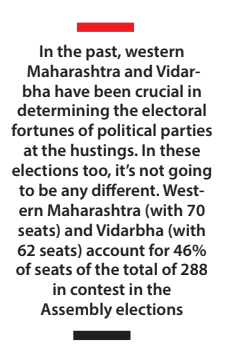
the hustings. In these elections too, it’s not
going to be any different. Western Maharashtra (with 70 seats) and Vidarbha
(with 62 seats) account for 46% of seats out of the total of 288 in contest in the
Assembly elections.
Western Maharashtra, traditionally a stronghold of the Congress and NCP, is witnessing a heated contest following Ajit Pawar’s move to ally with the BJP. The
resulting intra-family clash between Sharad Pawar and his nephew, Ajit Pawar, has
turned the political landscape into a highstakes arena where personal loyalties and political survival are at play. For Sharad Pawar, it’s a fight for prestige and survival,
for Ajit Pawar it’s a battle for staking his claim as the successor of the aging Sharad Pawar in Maratha politics. Meanwhile, in Vidarbha, once a BJP
bastion, the Congress has gained ground,
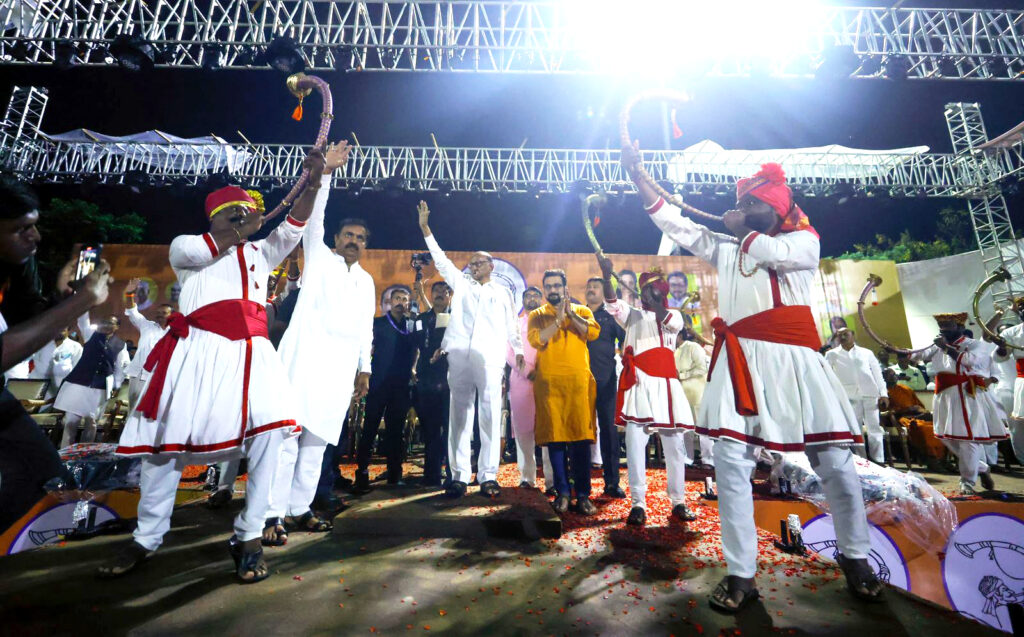
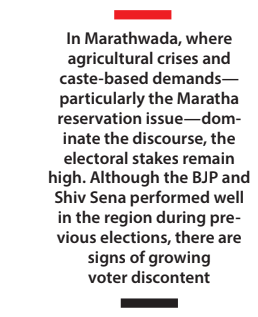
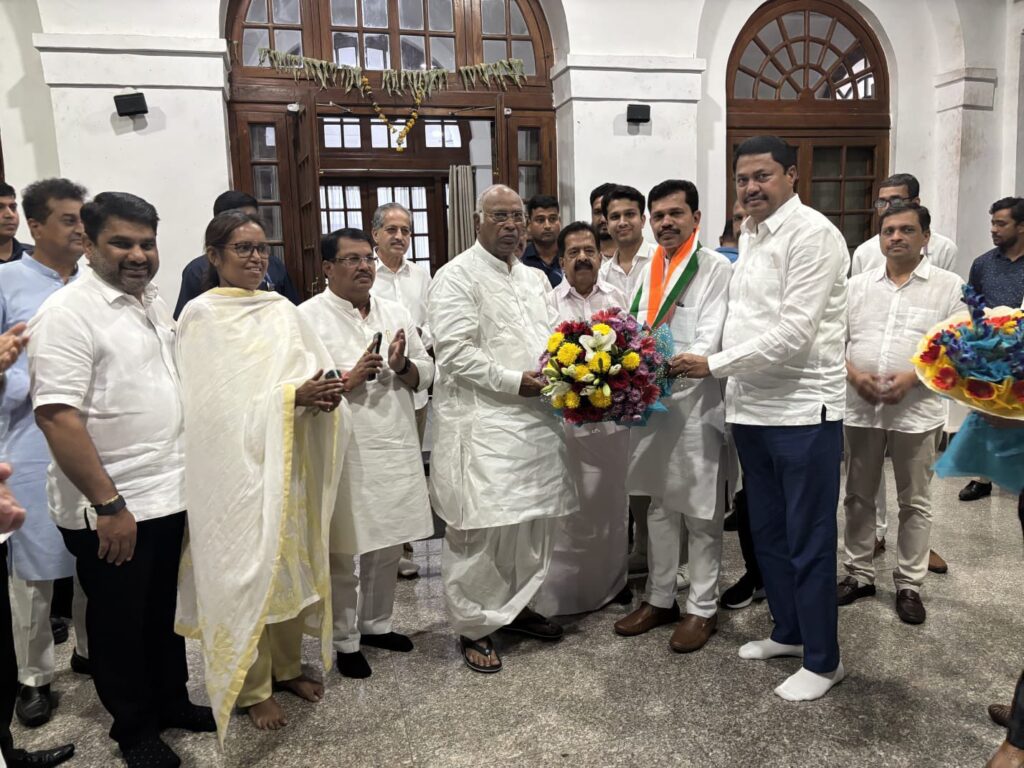
The NCP (SP) and Congress have to bring their top game to defeat the Mahayuti coalition
especially following its improved performance in this summer’s Lok Sabha elections. The opposition hopes to build on this
momentum, posing a new challenge to the
BJP in a region it once controlled comfortably. The BJP lost three seats each in western Maharashtra and Vidarbha in the 2024
Lok Sabha elections.
In Marathwada, where agricultural crises and caste-based demands—particularly
the Maratha reservation issue—dominate
the discourse, the electoral stakes remain
high. Although the BJP and Shiv Sena performed well in the region during previous
elections, signs of growing voter discontent
have given the Congress and NCP an
opportunity to seize the initiative. In the
2024 Lok Sabha elections, the BJP did not
win any seat.
The election is not just about battling
opponents but also about managing internal conflicts within alliances. Both coalitions—the Mahayuti and MVA—are grap
pling with internal challenges as they
attempt to finalise seat-sharing deals and
streamline campaign strategies.
The Mahayuti coalition is still reeling
and has struggled to maintain momentum
following poor Lok Sabha election results a
few months ago, especially of the Ajit
Pawar-led NCP. In contrast, the MVA is
buoyed by recent electoral gains and is
banking on discontent within the ruling
coalition to push its campaign forward.
However, Uddhav Thackeray’s Shiv
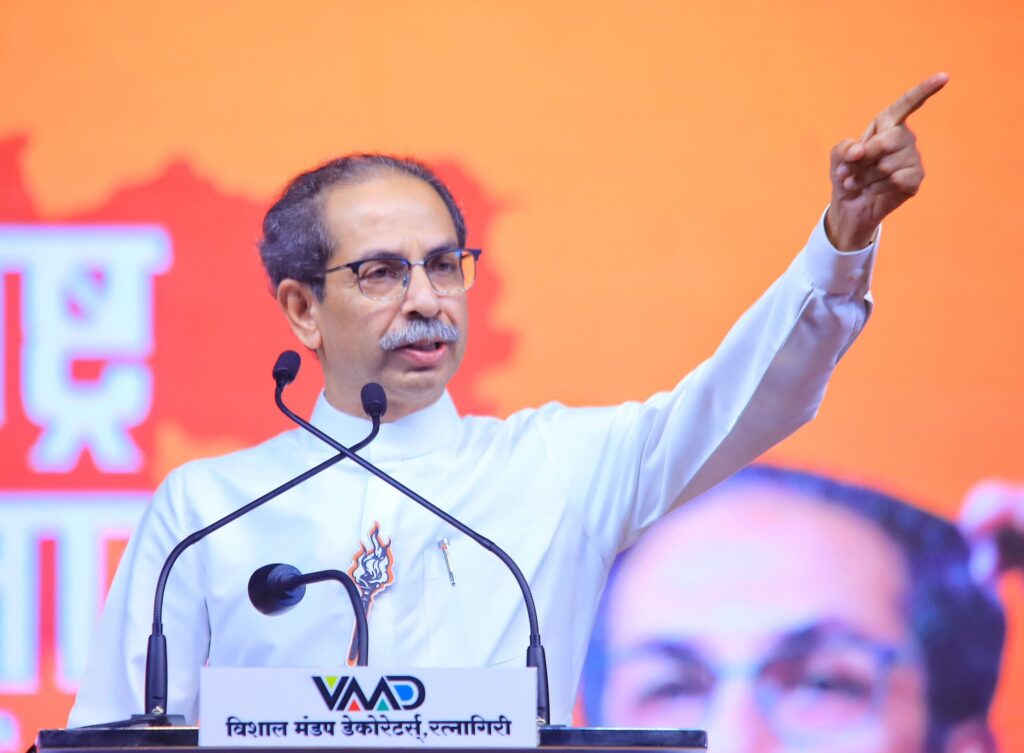
For the Uddhav Thackeray faction of the Shiv Sena, the Maharashtra elections amounts to an existential battle
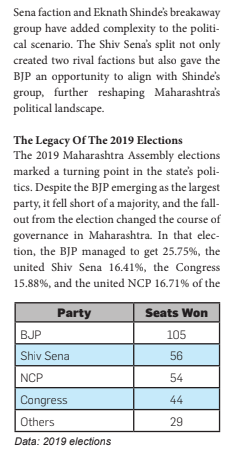
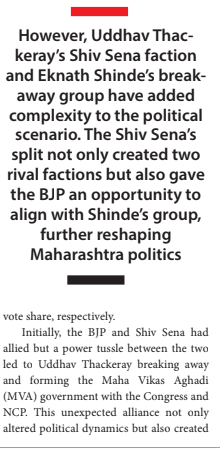
a new narrative of betrayal and shifting loyalties, which continues to influence the
upcoming elections. However, both the Shiv Sena and the NCP split in July 2023, and the breakaway factions of the two parties led by Eknath Shinde and Ajit Pawar,
respectively, joined hands with the BJP to
form the government.
Seat-Sharing Agreements
In the run-up to the 2024 Assembly elections, the parties in both alliances were locked in intense negotiations. To hammer
out the seat-sharing arrangements in the
Mahayuti, Union Home Minister Amit Shah had to intervene personally. A meeting involving Shah, Deputy Chief Ministers
Devendra Fadnavis and Ajit Pawar, and other key leaders ironed out the details of the seat-sharing arrangement. The BJP’s
first list included prominent names like Fadnavis, contesting from Nagpur SouthWest, and Chandrashekhar Bawankule,
contesting from Kamthi.
Finally, the BJP is contesting on 148
seats, the Shiv Sena 82 seats, the NCP 53 seats and five seats were given to smaller parties in the alliance. On the other side,
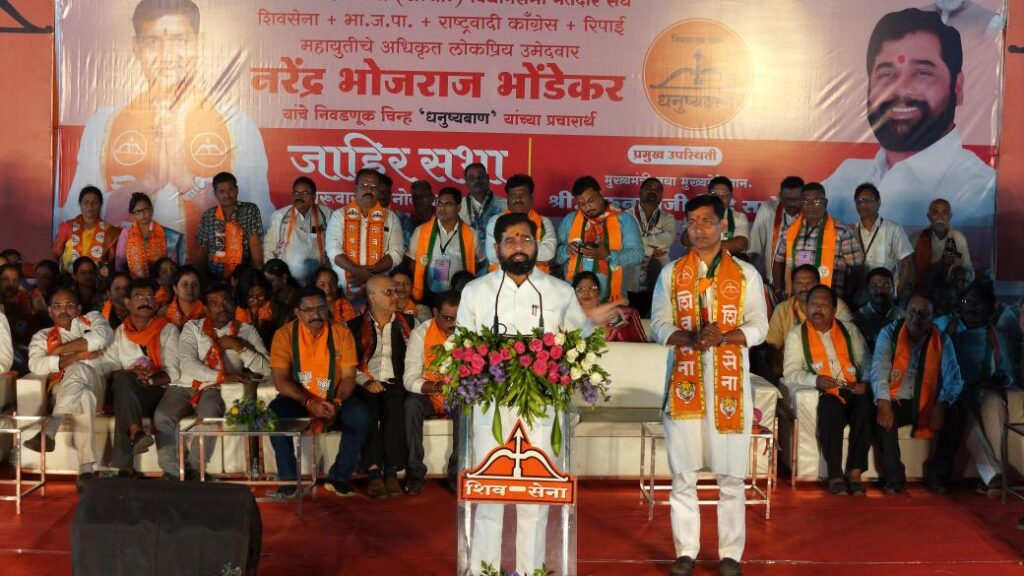
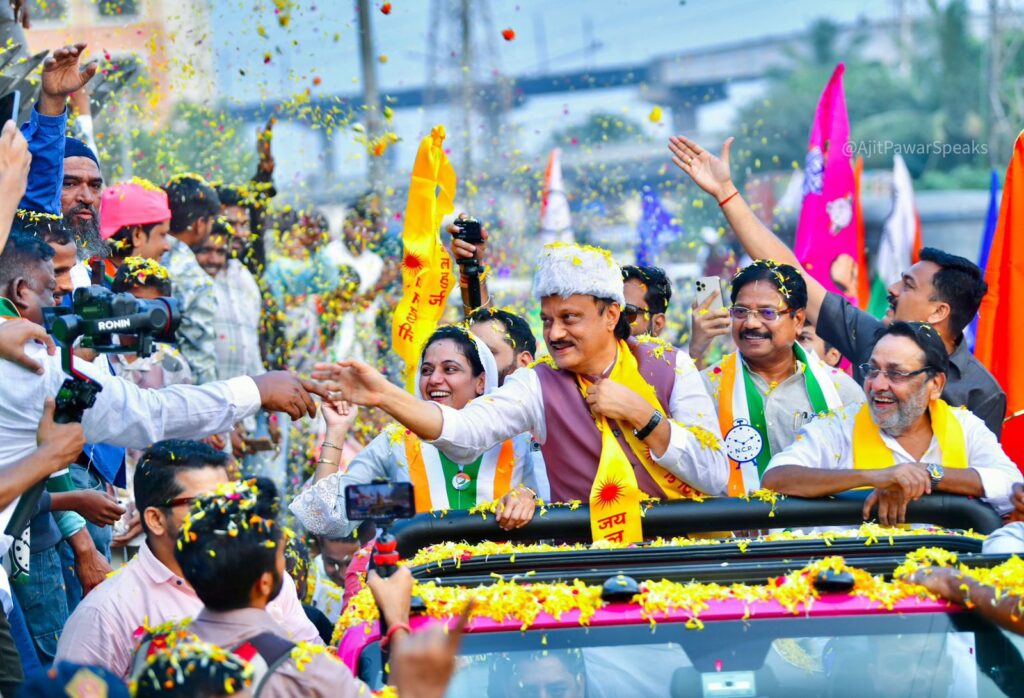
Eknath Shinde and Ajit Pawar have to significantly improve their performances compared to their showings in the Lok Sabha elections
the MVA alliance too was grappling with a
seat-sharing formula. By October 29,
Congress candidates filed nominations in
103 seats, the Shiv Sena (UBT) in 89 seats,
the NCP (SP) in 87 seats, while the remaining seats were distributed among other
INDIA bloc parties.
Each party is adapting its strategy
according to the changing political landscape, focusing on critical issues that resonate with voters. The Congress is targeting
farmers, rural communities, and economically weaker sections, while criticising the
BJP’s policies as anti-poor. Sharad Pawar’s
NCP faction hopes to maintain its grip on
the Maratha vote bank and solidify its alliance with Uddhav Thackeray’s faction and
the Congress. Ajit Pawar’s NCP group is
focused on consolidating its hold on power
through its alliance with the BJP, prioritising governance and stability.
Uddhav Thackeray’s Shiv Sena faction
is campaigning on a “loyalty vs betrayal”
theme, seeking to position itself as the true
custodian of the Shiv Sena’s legacy, while
painting Shinde’s faction as turncoats.
Shinde’s group, on the other hand, is
expected to emphasise stability and governance, using its current control of the state
to attract urban and Marathi voters. The
BJP is relying on the Hindutva narrative,
development agenda, and welfare schemes
initiated by the Central government. The
party hopes to leverage the strength of its
alliance with Shinde’s faction and Ajit
Pawar’s group to retain power. The BJP is
also working to consolidate the Other Backward Caste (OBC) votes in its favour
as it did in Haryana. Though the factors at play in the two states are vastly different, the BJP has got the momentum behind it
following its stunning success in the Haryana elections.
Key Issues
Agricultural Crisis: The opposition, especially the NCP and Congress, aims to tap into rural discontent over unresolved agricultural problems.
Maratha Reservation: The ruling coalition may face backlash from the Maratha
Uddhav Thackeray’s
Shiv Sena faction is
campaigning on a ‘loyalty
vs betrayal’ theme, seeking
to position itself as the
true custodian of the
Shiv Sena’s legacy, while
painting Shinde’s faction
as turncoats. Shinde’s
group, on the other hand,
is expected to emphasise
stability and governance
community if it fails to address the reservation demand.
Unemployment: Youth and urban voters, frustrated with joblessness, could drift
toward the opposition.
Inflation: Rising prices of essential goods could hurt the BJP’s standing among middle-class and poor voters.
Modi And Yogi In The Campaign Arena
Prime Minister Narendra Modi and Uttar Pradesh Chief Minister Yogi Adityanath are expected to play a crucial role in the
BJP’s campaign. Modi’s development agenda is expected to resonate with urban and young voters, while Adityanath’s
emphasis on Hindutva and law and order may strengthen the BJP’s appeal in rural and religious communities. The opposition will need to counter the BJP’s star
power by focusing on local issues and rallying support around themes of trust,
betrayal, and governance.
The 2024 Maharashtra Assembly elections are shaping up to be one of the most unpredictable contests in recent years. Multiple alliances, intra-party rivalries, and shifting voter sentiments will play pivotal roles in determining the final outcome. With the ruling Mahayuti coalition
and the opposition MVA alliance locked in a fierce contest, the election result will not only decide Maharashtra’s future leadership but also shape the political trajectory of the state for years to come and also other state elections due next year


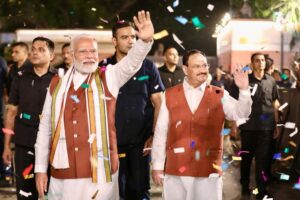
Add Comment